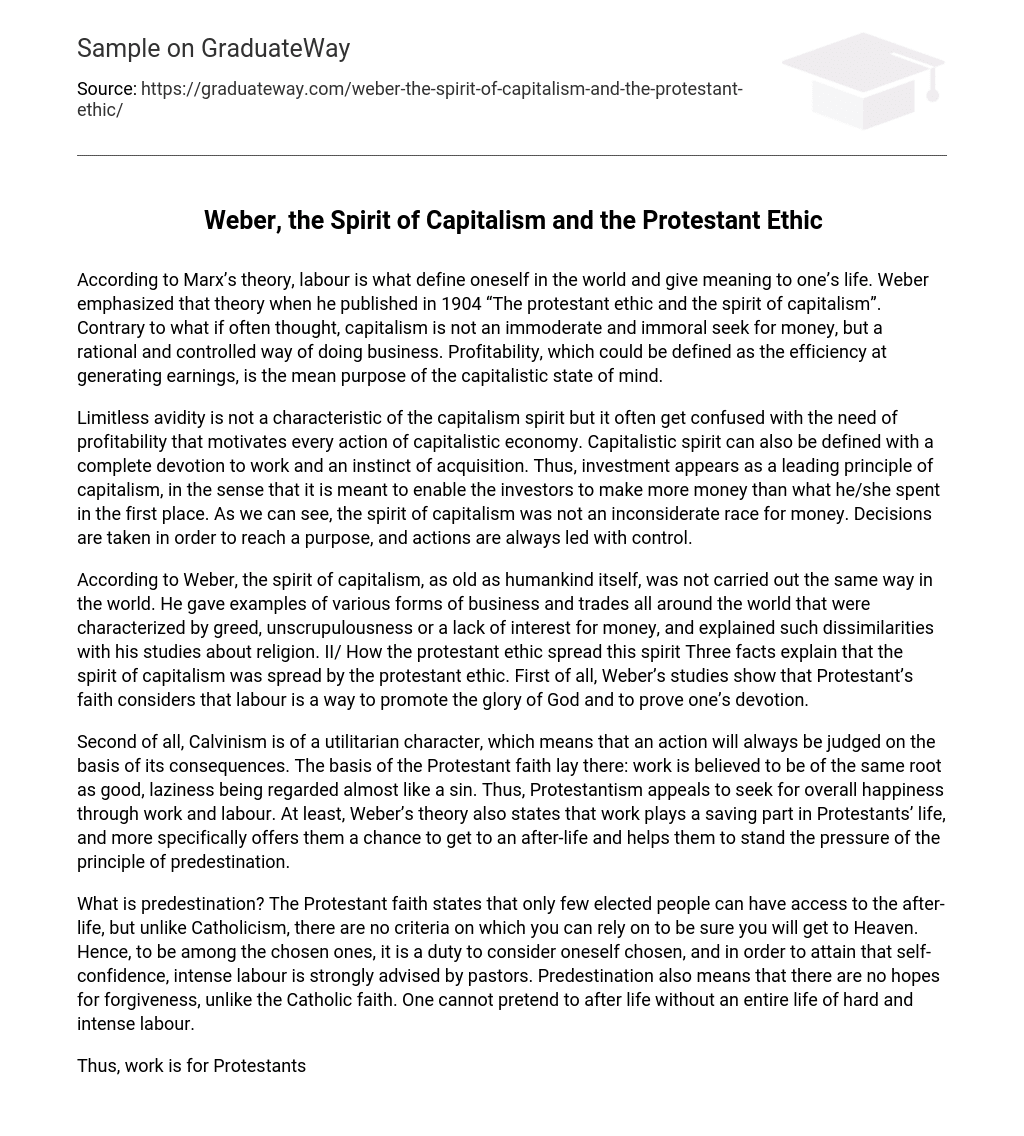According to Marx’s theory, labour is what define oneself in the world and give meaning to one’s life. Weber emphasized that theory when he published in 1904 “The protestant ethic and the spirit of capitalism”. Contrary to what if often thought, capitalism is not an immoderate and immoral seek for money, but a rational and controlled way of doing business. Profitability, which could be defined as the efficiency at generating earnings, is the mean purpose of the capitalistic state of mind.
Limitless avidity is not a characteristic of the capitalism spirit but it often get confused with the need of profitability that motivates every action of capitalistic economy. Capitalistic spirit can also be defined with a complete devotion to work and an instinct of acquisition. Thus, investment appears as a leading principle of capitalism, in the sense that it is meant to enable the investors to make more money than what he/she spent in the first place. As we can see, the spirit of capitalism was not an inconsiderate race for money. Decisions are taken in order to reach a purpose, and actions are always led with control.
According to Weber, the spirit of capitalism, as old as humankind itself, was not carried out the same way in the world. He gave examples of various forms of business and trades all around the world that were characterized by greed, unscrupulousness or a lack of interest for money, and explained such dissimilarities with his studies about religion. II/ How the protestant ethic spread this spirit Three facts explain that the spirit of capitalism was spread by the protestant ethic. First of all, Weber’s studies show that Protestant’s faith considers that labour is a way to promote the glory of God and to prove one’s devotion.
Second of all, Calvinism is of a utilitarian character, which means that an action will always be judged on the basis of its consequences. The basis of the Protestant faith lay there: work is believed to be of the same root as good, laziness being regarded almost like a sin. Thus, Protestantism appeals to seek for overall happiness through work and labour. At least, Weber’s theory also states that work plays a saving part in Protestants’ life, and more specifically offers them a chance to get to an after-life and helps them to stand the pressure of the principle of predestination.
What is predestination? The Protestant faith states that only few elected people can have access to the after-life, but unlike Catholicism, there are no criteria on which you can rely on to be sure you will get to Heaven. Hence, to be among the chosen ones, it is a duty to consider oneself chosen, and in order to attain that self-confidence, intense labour is strongly advised by pastors. Predestination also means that there are no hopes for forgiveness, unlike the Catholic faith. One cannot pretend to after life without an entire life of hard and intense labour.
Thus, work is for Protestants an act of justification of their faith, a mean to struggle against evil and sin, and a way to get to after-life. This explains why labour has the utmost importance in Protestant’s faith. It is believed that God helps those who help themselves: by working hard, Protestants create their own salvation. One’s duty at work, which is for capitalistic culture a mix between the search of efficiency, profitability and sense of investment, was influenced and eased by the Protestants and their religious behaviour towards labour.
The Calvinism was though the perfect state of mind for the capitalistic spirit to grow and expand in the society. Examples: -Uncle Scrooge is widely known for his greed, especially towards his nephew Donald. He is the cliche of the rich capitalistic businessman, and in some points his attitude seems Protestant. He considers laziness, and more specifically Donald’s laziness, as a sin. Moreover, whenever Donald asks him for money, Uncle Scrooge always refuses: not helping sinners was an obligation for Protestants, because they think that otherwise they would disturb God’s work.
Scrooge is also working day and night in order to invest, buy and sell as much as possible. We can also consider that his ultimate purpose is to worship his very own God, the first penny he earned, just as Protestant used to do. -On the contrary, hippies are a good counter example of what the spirit of capitalism and the Protestant ethic is. They do want peace in the whole world and they spread message of eternal love in order to achieve that ultimate goal.
But their attitude and behaviours cannot be considered close from the Protestant ethic for that they refuse to seek for the more profitability possible trough work. Hippies do not want economic growth, their original objective being to live in little communities, producing themselves what they need without any trades, investment or sell. -Another example would be the Wasp, or the White Anglo-Saxon Protestant, one of the first communities that settled down in USA. Their ethic allowed economic growth in the states they were established in, while states with a majority of Christians were slower and not as rich.
Weber quoted Benjamin Franklin in this book in order to illustrate his theory, although he wasn’t himself a Protestant. In God we trust = religious mark. Calvinist doctrine of predestination (salvation by ascetic devotion to profession) is the origin of the spirit of capitalism (profession as a calling), which contributes to development of modern capitalism (increasing rationalization of an economic system driven by gain) Weber’s paradox: Is capitalism rational and irrational? Relative to efficiency, capitalism is rational. Relative to happiness, capitalism is irrational.





